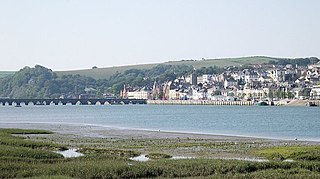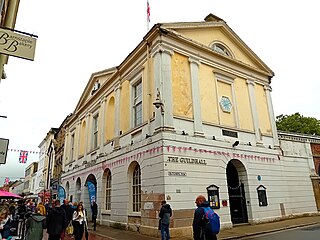
Bideford is a historic port town on the estuary of the River Torridge in north Devon, south-west England. It is the main town of the Torridge local government district.

Great Torrington is a market town in Devon, England. Parts of it are sited on high ground with steep drops down to the River Torridge below, with the lower-lying parts of the town prone to occasional flooding. Torrington is in the centre of Tarka Country, a landscape captured by Henry Williamson in his novel Tarka the Otter in 1927. Great Torrington has one of the most active volunteering communities in the United Kingdom.

Barnstaple is a river-port town and civil parish in the North Devon district of Devon, England. The town lies at the River Taw's lowest crossing point before the Bristol Channel. From the 14th century, it was licensed to export wool from which it earned great wealth. Later it imported Irish wool, but its harbour silted up and other trades developed such as shipbuilding, foundries and sawmills. A Victorian market building survives, with a high glass and timber roof on iron columns.

Instow is a village in north Devon, England. It is on the estuary where the rivers Taw and Torridge meet, between the villages of Westleigh and Yelland and on the opposite bank to Appledore. There is an electoral ward with the same name. The ward's total population at the 2011 census was 1,501.

The Bideford Railway Heritage Centre CIC in Devon, England is a community interest company that is responsible for the management of the site of Bideford railway station. The company is also responsible for Instow signal box which opens on occasional Sundays and bank holidays from Easter to October.

The Tarka Trail is a series of footpaths and cyclepaths around north Devon, England that follow the route taken by the fictional Tarka the Otter in the book of that name. It covers a total of 180 miles (290 km) in a figure-of-eight route, centred on Barnstaple.

The North Devon Railway was a railway company which operated a line from Cowley Bridge Junction, near Exeter, to Bideford in Devon, England, later becoming part of the London and South Western Railway's system. Originally planned as a broad gauge feeder to the Bristol & Exeter Railway, it became part of a battle between the broad gauge group and the standard gauge railway interests. In this context, standard gauge lines were often described as narrow gauge.
Devon County Constabulary was the Home Office police force for the county of Devon, England, until 1966.

Torrington railway station was a railway station located in Great Torrington, Devon. It was closed by British Railways in 1965 as part of the Beeching cuts.

Karpatiosorbus devoniensis is known by the English name of Devon whitebeam and formally as Broad-leaved Whitebeam. When the fruit was reported as sold at Barnstaple Pannier Market the name French Eagles was used, apart from 1929 when they were reported as eagle-berries. When the trees were reported as seen growing wild on botanical walks they were referred to as French Hails. Broad-leaved white-beam, which was the common name until Devon Whitebeam took over, was used once in 1907. The term Otmast was used once as a pet name, as its true identity was not known. It is a species of whitebeam, trees and shrubs in the family Rosaceae. It is endemic to the British Isles, growing wild in areas of Devon, Cornwall, Somerset and south-east Ireland as a native and north-east Ireland as an introduction.

Monkleigh is a village, parish and former manor in north Devon, England, situated 2 1/2 miles north-west of Great Torrington and 3 1/2 miles south-east of Bideford. An electoral ward exists titled Monkleigh and Littleham. The population at the 2011 census was 1,488.

The Tarka Valley Railway in Devon, England, is a heritage railway that plans to rebuild the Torrington to Bideford section of the Barnstaple to Halwill Junction railway line. So far a short demonstration line of 300 yd of track in the direction of Bideford plus a siding alongside the old coal dock have been re-laid. The railway has been fenced off from the Tarka Trail ensuring the safety of all involved. Restoration of various items of rolling stock is currently under way.
The Devon Rugby Football Union is the governing body for the sport of rugby union in the county of Devon in England. The union is the constituent body of the Rugby Football Union (RFU) for Devon, and administers and organises rugby union clubs and competitions in the county. It also administers the Devon county rugby representative teams.

The Guildhall in Barnstaple in Devon in the United Kingdom is the Guildhall for the town and was completed in 1828, replacing an earlier Guildhall. Beneath and behind the Guildhall is the Pannier Market; completed in 1855, the building has been a Grade II* listed building since 19 January 1951.

The Pannier Market in Bideford in North Devon is a large covered Victorian pannier market together with the Butcher's Row of small artisan stalls running along the lower level of the Market. There has been a market on the site since 1675. Since 1989 it has been a Grade II listed building on the register of Historic England.

The Pannier Market in Great Torrington in Devon is a Victorian pannier market of 12 small indoor shops - six either side of a narrow cobbled lane built in 1842 and restored in 1999. The Market House building at the front of the complex has been a Grade II* listed building on the Historic England Register since 1951.

South Molton Pannier Market is the pannier market for the town of South Molton in Devon, England located behind the town's Grade I listed Guildhall which was constructed between 1739 and 1741.















